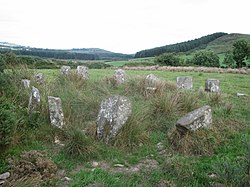| Revision as of 13:54, 23 January 2023 editDoebLoggs (talk | contribs)Extended confirmed users, Rollbackers30,761 edits == out of context← Previous edit | Revision as of 10:49, 27 July 2023 edit undo38.101.95.175 (talk) updated diameter and stone count and added gps coordsNext edit → | ||
| Line 14: | Line 14: | ||
| | native_name = Carraig an Ghiolla | | native_name = Carraig an Ghiolla | ||
| | native_language = ga | | native_language = ga | ||
| |coordinates = {{coord|52|0|1.605|N|8|54|58.8132|W|region:IE|display=inline,title}} | |||
| }} | }} | ||
| Line 21: | Line 22: | ||
| ==Features== | ==Features== | ||
| Carrigagulla A is a |
Carrigagulla A is a 8m diameter stone circle comprising 16 standing stones circling a central slab.<ref>{{cite web | title=Carigagulla SW | work=The Megalithic Portal | url=http://www.megalithic.co.uk/article.php?sid=744 | access-date=2023-07-27}}</ref> It is thought that there originally may have been 17 stones in place. The Carrigagulla NE stone row comprising five stones, four of which have been moved and are now used as gates. The stone row at Carrigagulla SW is built from three stones, one of which has fallen.<ref>{{cite web | title=Carigagulla SW | work=The Megalithic Portal | url=http://www.megalithic.co.uk/article.php?sid=1808 | access-date=2008-06-12}}</ref> | ||
| Carrigagulla Ogham Stone was discovered by ] during peat cutting, but the exact location of the find is not known. It has been housed in ] since 1940.{{fact|date=June 2021}} | Carrigagulla Ogham Stone was discovered by ] during peat cutting, but the exact location of the find is not known. It has been housed in ] since 1940.{{fact|date=June 2021}} | ||
| Line 37: | Line 38: | ||
| * | * | ||
| * | * | ||
| * | |||
| {{coord missing|County Cork}} | {{coord missing|County Cork}} | ||
Revision as of 10:49, 27 July 2023
Megalithic complex in Cork, Ireland
| Carrigagulla | |
|---|---|
| Native name Carraig an Ghiolla (Irish) | |
 | |
| Coordinates | 52°0′1.605″N 8°54′58.8132″W / 52.00044583°N 8.916337000°W / 52.00044583; -8.916337000 |
| National monument of Ireland | |
| Official name | Carrigagulla |
| Reference no. | 660 |
Carrigagulla (Irish: Carraig an Ghiolla) is a megalithic complex 2.9 km north-east of Ballinagree, County Cork, Ireland.
It consists of two axial stone circle, two stone rows, and an ogham stone which has been moved around a half mile away.
Features
Carrigagulla A is a 8m diameter stone circle comprising 16 standing stones circling a central slab. It is thought that there originally may have been 17 stones in place. The Carrigagulla NE stone row comprising five stones, four of which have been moved and are now used as gates. The stone row at Carrigagulla SW is built from three stones, one of which has fallen.
Carrigagulla Ogham Stone was discovered by Coillte Teoranta during peat cutting, but the exact location of the find is not known. It has been housed in Cork Public Museum since 1940.
See also
References
- "National Monuments of County Cork in State Care" (PDF). heritageireland.ie. National Monument Service. p. 2. Retrieved 2 July 2020.
- "Carraig an Ghiolla/Carrigagulla". logainm.ie. Retrieved 2 July 2022.
- Weir, A (1980). Early Ireland. A Field Guide. Belfast: Blackstaff Press. pp. 113–114.
- "Carigagulla SW". The Megalithic Portal. Retrieved 27 July 2023.
- "Carigagulla SW". The Megalithic Portal. Retrieved 12 June 2008.
Sources
- Denis Power (1997). Archaeological inventory of County Cork, Volume 3: Mid Cork, 6435 P10. ColorBooks. ISBN 0-7076-4933-1
External links
Categories: